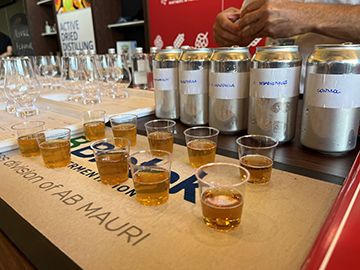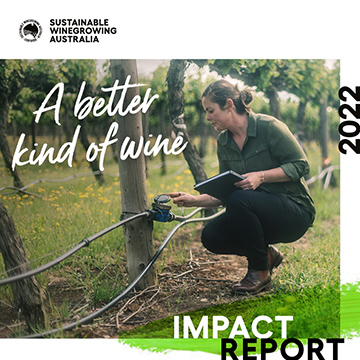Characterising yeast strains with links to beverages produced by Australia’s Indigenous peoples
Life cycle analysis shows 10% reduction in carbon emissions for Australian wine since 2016
Use the AWRI winemaking calculators to avoid costly mistakes with additives
Affinity Labs launches new method for phos acid
Sustainable Winegrowing Australia impact report available
Register now for the Advanced Wine Technology Course
Save the dates for this year’s Advanced Viticulture Courses
Order the latest AWRI publications online
Characterising yeast strains with links to beverages produced by Australia’s Indigenous peoples |
|
 |
Over the course of human history and in societies across the world, fermented beverages have held both economic and cultural importance. In Australia, way-a-linah, an alcoholic beverage produced from the fermented sap of Eucalyptus gunnii, and tuba, a fermented drink made from the syrup of Cocos nucifera fructifying bud, are two of several fermented beverages produced by Australian Aboriginal and Torres Strait Islander people. AWRI researchers and collaborators from the University of Adelaide and ANU isolated yeast strains from two locations in Australia – the Central Plateau in Tasmania and Erub Island in the Torres Strait. Strains were identified using molecular methods and then eight isolates were evaluated for their volatile profile during the fermentation of wort, apple juice and grape must, with diverse volatile profiles observed in the beverages produced. This work was recently published in the journal Food Microbiology and presented by Dr Cristian Varela at the Asia Pacific Section Convention of the Institute of Brewing and Distilling in Adelaide, where attendees also had the chance to taste some of the beers made with these isolates. To find out more, contact the AWRI library to request a copy of the article or email Cristian.Varela@awri.com.au. |
Life cycle analysis shows 10% reduction in carbon emissions for Australian wine since 2016The AWRI recently updated its calculations of the carbon footprint for the production and distribution of Australian wine, in a project funded by Wine Australia. Overall emissions per litre of wine were 10% lower than the previous analysis conducted in 2016. The most important factor driving this drop was the increasing proportion of renewable energy generation in Australia. Increases in bulk wine export and improvements in glass recycling also contributed to emissions reductions. To delve into all the details, read the article summarising this work published in the most recent issue of Wine & Viticulture Journal or contact Kieran Hirlam (Kieran.Hirlam@affinitylabs.com.au). |
|
Use the AWRI winemaking calculators to avoid costly mistakes with additives |
|
 |
The AWRI helpdesk has dealt with several queries this vintage from winemakers who have made errors when making additions, such as over-additions of copper sulfate or sulfur dioxide. This can end up requiring costly remediation steps and additional time and may also have impact on overall wine quality. The AWRI winemaking calculators make it easy to perform a wide range of calculations – minimising the risk of errors. The calculators are available online via the AWRI website or as an app from Google or Apple, which is free within Australia and available for purchase overseas. Download the app now to always have the calculators at your fingertips! |
Affinity Labs launches new method for phos acid residue analysisTo support wine producers concerned about the potential for breaching residue limits in export markets, Affinity Labs has just launched a new method for analysing phosphorous acid in grapes and wine. Using the latest liquid chromatography/mass spectrometry techniques, the team can now deliver results within a turnaround time of 10 rather than 15 days. The price for phos acid analysis has also dropped significantly with the launch of the new method. Phosphorous acid (commonly known as phos acid) is a fungicide registered for use in Australian vineyards, where it is used to treat outbreaks of downy mildew. It is important for wine exporters to understand if their wines have any residues of phos acid, because some export markets including China, Argentina and India, have very low or no tolerance for phos acid residues in wine. Information about residue limits in different markets is available from the AWRI’s agrochemicals online search function and agrochemicals app. To find out more about the new method, or to book in samples for analysis, contact Affinity Labs’ customer service team on 08 8313 0444 or customerservice@affinitylabs.com.au. |
|
Sustainable Winegrowing Australia impact report available |
|
 |
Sustainable Winegrowing Australia has recently released its Impact Report for 2021/22. This is a summary of the national data set that demonstrates the commitment to sustainability of the Australian grape and wine community. The report reveals 48% growth in membership by Australian grapegrowers and winemakers, with the program now representing 40% of total wine production. It highlights the sustainable practices members are undertaking and displays the demand from consumers for sustainably made wine. For more information about Sustainable Winegrowing Australia, visit the program website or contact the AWRI helpdesk on helpdesk@awri.com.au. |
Register now for the Advanced Wine Technology CourseThe AWRI will present its first Advanced Wine Technology Course (AWTC) in June 2023. This hands-on, intensive, four-day course will cover the latest techniques and technologies in wine production. Participants will travel in a group across a number of South Australian wine regions to visit sites and meet producers at the cutting edge of Australian wine. The course is aimed at winery owners, winemakers, production managers and engineers with an interest in innovation and technology. Participation is limited to a maximum of 20 attendees to ensure an interactive learning experience. Program content includes demonstrations of technologies at small, medium and large wineries; no- and low-alcohol wine and spirits production; innovations in packaging, automation and sensors; structured themed tastings; and technologies from other food and beverage industries. For more information and a link to register, visit the AWTC webpage. |
|
Save the dates for this year’s Advanced Viticulture CoursesTwo Advanced Viticulture Courses (AVCs) will be presented in October and November, with the following dates now locked in:
To express interest in the course and make sure you don’t miss the chance to register, please complete this online form. The events team will contact you with more information prior to registrations opening. |
|
Order the latest AWRI publications onlineAccessing the latest AWRI publications is easy. Visit the AWRI Publications web page to:
The AWRI’s most recent publications are listed below. 2327 Coulter, A. 2023. Ask the AWRI: Wine taints from oak. Aust. N.Z. Grapegrower Winemaker (709): 56-57. (Read online) 2328 Scrimgeour, N. 2023. Achieving success with canned wines. Aust. N.Z. Grapegrower Winemaker (709): 84-87. 2329 Godden, P., Wilkes, E. 2023. Trends in the composition of Australian wine 1990 to 2021. Part one: Introduction, titratable acidity and pH. Wine Vitic. J. 38(1): 20-24. 2330 Scrimgeour, N., Hirlam, K., Hsieh, D., Wilkes, E., Krstic, M. 2023. Canned wine: Looking for a silver lining. Wine Vitic. J. 38(1): 28-34. (Read online) 2331 Dry, P. 2023. Schioppettino. Wine Vitic. J. 38(1): p. 68. 2332 Mierczynska-Vasilev, A.M., Kulcsar, A.C., Dabare, P.R.L., Vasilev, K.A., Bekker, M. 2023. Surface nanoengineering technology for the removal of sulfur compounds associated with negative attributes in wines. npj Sci. Food 7: 5. (Read online) 2333 Bekker, M.Z., Cuijvers, K.M., Kulcsar, A.C., Sanders, R.D., Capone, D.L., Jeffery, D.W., Schmidt, S.A. 2023. Effects of yeast strain and juice nitrogen status on glutathione utilisation during fermentation of model media. Aust. J. Grape Wine Res. 2023: 8041096. 2334 Varela, C., Alperstein, L., Sundstrom, J., Solomon, M., Brady, M., Borneman, A., Jiranek, V. 2023. A special drop: Characterising yeast isolates associated with fermented beverages produced by Australia’s indigenous peoples. Food Microbiol. 112: 104216. (Read online) 2335 Payne, E.M., Taraji, M., Murray, B.E., Holland-Moritz, D.A., Moore, J.C., Haddad, P.R., Kennedy, R.T. 2023. Evaluation of analyte transfer between microfluidic droplets by mass spectrometry. Anal. Chem. 95(10): 4662-4670. (Read online) 2336 Longbottom, M. 2023. Ask the AWRI: Understanding Australian sustainability credentials. Aust. N.Z. Grapegrower Winemaker (710): 45-46. 2337 Mierczyński, P., Mierczyńska-Vasilev, A., Maniukiewicz, W., Vasilev, K., Szynkowska-Jozwik, M. 2023. Novel Cu and Pd-Cu catalysts supported on multi-walled carbon nanotubes for steam reforming and decomposition of methanol. Catalysts 13: 533. (Read online) 2338 Wu, Q., Habili, N., Kinoti, W.M., Tyerman, S.D., Rinaldo, A., Zheng, L., Constable, F.E. 2023. A metagenomic investigation of the viruses associated with Shiraz disease in Australia. Viruses 15: 774. (Read online) 2339 Mierczyński, P., Mierczyńska-Vasilev, A., Vasilev, K., Szynkowska-Jozwik, M.I. 2023. Fourier transform infrared spectroscopic studies of methane and liquefied natural gas reforming processes on Ni/CeO2 catalyst. React. Kinet. Mech. Cat. (Read online) 2340 Godden, P., Wilkes, E. 2023. Trends in the composition of Australian wine 1990-2021. Part two: Alcohol and glucose plus fructose. Wine Vitic. J. 38(2): 30-33. 2341 Hirlam, K., Longbottom, M., Wilkes, E., Krstic, M. 2023. Understanding the greenhouse gas emissions of Australian wine production. Wine Vitic. J. 38(2): 34-36. (Read online) 2342 Dry, P. 2023. Grillo. Wine Vitic. J. 38(2): p. 59. |
|
AcknowledgementsThe AWRI acknowledges support from Wine Australia, with levies from Australia’s grapegrowers and winemakers and matching funds from the Australian Government. The AWRI is a member of the Wine Innovation Cluster in Adelaide, South Australia. |
|

